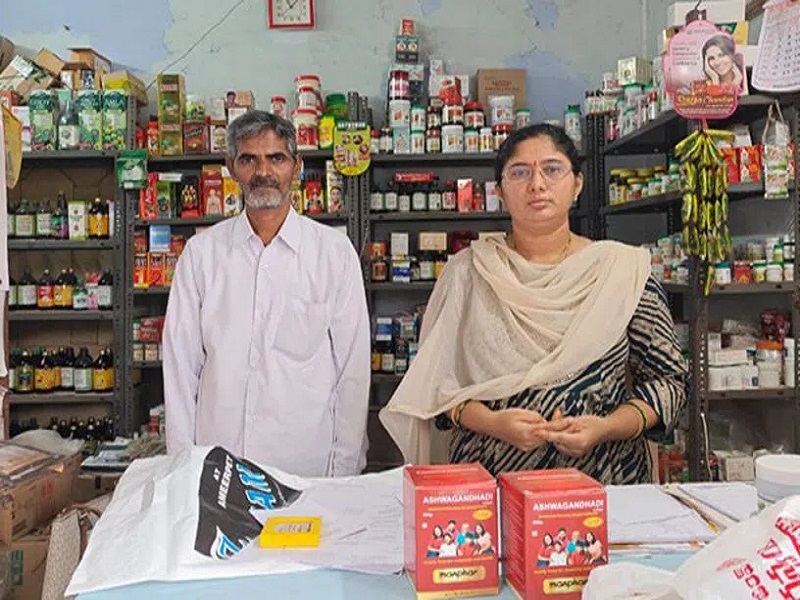The Telangana Drugs Control Administration (DCA) is cracking down on misleading labels from Ayurvedic medicine companies claiming to cure obesity and depression. As interest in traditional medicine grows, authorities stress the need for scientific validation and accurate information to protect consumers from false promises. Can medicine sold at a medical store claim to treat “Obesity” and “Depression and associated anxiety diseases and disorders of the brain”? This question remain silent with authorities.
The Drugs Control Administration (DCA) of Telangana officials have found certain medicines circulating in the market with misleading claims on their labels, stating that they treat “obesity” and “diseases and disorders of the brain.”
The DCA has seized these medicines, which falsely claim to cure these major non-communicable diseases causing distress to people in Telangana. Additionally, these medicines were seized from rural parts of the state, where quackery and medical stores often dispense medicine without prescriptions more frequently.
Claims of curing any disease are in contravention of the Drugs and Magic Remedies (Objectionable Advertisements) Act, 1954. This Act prohibits the advertisement of certain drugs for the treatment of specific diseases and disorders.
According to the DCA, no person shall participate in the publication of advertisements regarding the diseases or disorders indicated under the Drugs and Magic Remedies (Objectionable Advertisements) Act, 1954.
The obesity medicine
During raids conducted on 27 July to detect medicines with misleading and objectionable advertisements, the Drugs Inspector of Yadadri-Bhuvanagiri district detected Triphala Guggulu Tablets, an Ayurvedic medicine, manufactured by Siddh-ayu Ayurvedic Research Foundation Pvt Ltd from Madhya Pradesh.
The product label bears a misleading claim stating that it treats “Obesity.”
“First of all, you cannot put anything on the drug strip claiming that a person can be cured of obesity. In India, the sale of medicines is subject to strict regulatory oversight under the Drugs and Cosmetics Act, 1940. Also, many of these drugs are Ayurvedic medicines widely available in rural areas, often without stringent regulatory oversight. This lack of regulation means that many products do not undergo rigorous testing for safety or efficacy before reaching consumers,” said the drug official from Yadadri-Bhuvanagiri district to #Khabarlive.
He added that some Ayurvedic products are marketed with claims that they can cure various diseases, including serious conditions. Such claims are often unfounded and can mislead consumers, potentially leading to adverse health outcomes.
The Drugs and Cosmetics Act requires that a drug must have substantial clinical evidence supporting its efficacy and safety. “But for these products, Ayurveda companies make all these claims and sell them in the market without any oversight,” said the drug official.
He noted that the stocks of obesity medicines were seized during the raid conducted at a medical shop.
‘Depression and associated anxiety’
During a raid, the Drugs Inspector from Siricilla detected Ashwagandhadi Lehya, an Ayurvedic medicine manufactured by Manphar Ayurvedic Drugs from Vijayawada. The product label bears a misleading claim stating that it relieves “depression and associated anxiety.”
Stocks of the medicines were seized during the raid conducted at a medical shop in Siricilla.
“Drugs for depression and associated anxiety are scheduled drugs and cannot be sold without a doctor’s prescription. Additionally, these drugs cannot claim to cure mental distress,” said the drug official.
Meanwhile, the drug officials have said that further investigation shall be carried out and action shall be taken as per the law against all the offenders.
“Persons who make misleading advertisements regarding drugs for the treatment of certain diseases and disorders are punishable under the Drugs and Magic Remedies (Objectionable Advertisements) Act, 1954, with imprisonment which may extend to six months, or with fine, or with both,” said the DCA in its statement.
A 2012 study indicated that 63 percent of rural residents live more than 5 km from a pharmacy, causing significant distress due to the need for medicine. Additionally, a belief in traditional medicine has led to claims that it can cure several diseases. These pharmacies play a significant role in providing traditional medicines to patients.
Studies have shown that a substantial proportion of Ayurvedic products can contain harmful substances, including heavy metals like lead, mercury, and arsenic. One study indicated that one in five Ayurvedic products purchased online contained these toxic metals, often due to the use of herbs grown in contaminated soil.
Although there are guidelines for the manufacture and sale of Ayurvedic medicines, enforcement is often lax. This has led to a culture of non-compliance, where manufacturers may not adhere to safety and quality standards. Some Ayurvedic products are marketed with claims that they can cure various diseases, including serious conditions. Such claims are often unfounded and can mislead consumers, potentially leading to adverse health outcomes.
In many rural areas, traditional healers and practitioners who may not have formal medical training often prescribe Ayurvedic medicines. This practice can lead to the use of unverified and potentially harmful products.
The use of unregulated Ayurvedic drugs can pose significant health risks, including renal failure and other serious complications. An estimated one-third of patients with renal issues have a history of using Ayurvedic treatments, highlighting the potential dangers associated with these products.
There is a growing consensus that a robust regulatory framework is necessary to ensure the safety and efficacy of Ayurvedic medicines. This includes establishing standards for manufacturing, testing, and marketing these products to protect consumers and enhance public trust in alternative medicine. #hydkhabar

